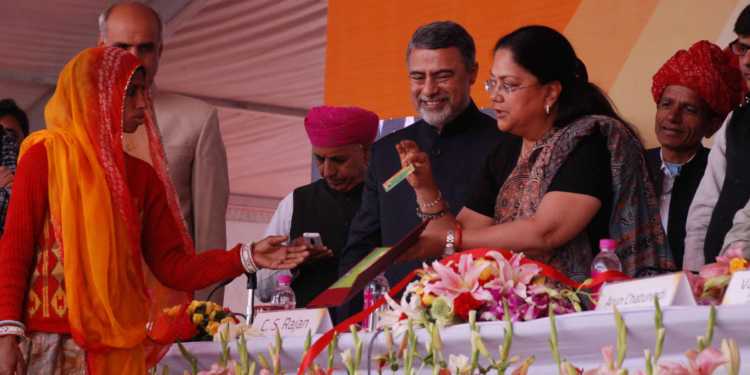CM Vasundhara Raje led Rajasthan government had planned to distribute free mobile phones to women who come from families which fall under the Below Poverty Line (BPL) category and Wifi facilities to around 5,000-gram panchayats in the state. The distribution of mobile phones was to be done through the Bhamashah Digital Parivaar Yojana. Bhamashah Yojana is arguably the most efficient Direct Benefit Transfer (DBT) scheme in any state in the country. Under the Bhamashah Yojana, financial and non-financial benefits of government schemes are provided to the women head of the family in a transparent manner through cards made under their name. CM Vasundhara Raje government is at the forefront of implementation of Digital India campaign through Bhamashah Yojana. The state government had also launched Bhamashah wallet to encourage digital payments among rural populations of the state. The seamless connectivity of internet being provided to women will also come in handy for their personal security.
Rajasthan has always been ahead in implementing Direct Benefit Transfer. The Bhamashah card was launched in 2014 to transfer benefits of public services to women head of BPL families. In June 2017, the state government made the Bhamashah card mandatory for availing welfare benefits. The card is also used for issuing birth, death and marriage certificates. The card is also used to transfer benefits from the Mukhyamantri Rajshree Yojana which was launched in 2016 to stop female foeticide and encourage girl child education. Under the scheme, the mother of a girl child gets Rs 2,500, further on completion of one year period if all vaccinations are done properly, the second installment of Rs 2,500 is also released. The monetary benefits keep coming at various stages of development of the girl child and continue till she passes Class XII when the family is eligible for the final installment of Rs 25,000.
The Bhamashah Yojana was started by Vasundhara Raje government way back in 2008, and was reintroduced in 2014 to promote financial inclusion and to cut out the middle men in delivery of public services and to empower women. Therefore, it can be said that Vasundhara Raje was a term ahead of the central government, which started the DBT program only in 2013 and it could be properly implemented only after the PM Modi led government came to power in 2014. Way back in 2008, Aadhar did not have such a wide reach and so the Rajasthan government had to launch its own Bhamashah card for unique identification. The scheme was named after Bhamashah, a famous minister, financier and general who helped Maharana Pratap. So far 1.6 crore families have enrolled under the scheme and the government has already provided benefits worth Rs 22,000 crore under the scheme.
The Rajasthan government has uplifted the status of women in the family through the Bhamashah scheme. Women are likely to spend more efficiently than men, and for them family needs take priority. Bolsa Família, one of the most successful social security programs in the world, started by the Brazilian government was also based on conditional cash transfer and it also provided benefits to the women head of family. The government has opened more than 35,000 centers in the rural areas of the state where ATM facilities are not available. The beneficiary could use Rupay card for transaction and could easily extract cash and its details are messaged on beneficiaries registered numbers.
 Government has saved overall leakage of almost 90,000 crore by using DBT. In 2016-17 alone, the government was able to save Rs 32, 984 crore just by plugging leakage. DBT also made transfer of MGNREGA benefits more transparent and removed the middle man. Earlier, the gram pradhans used to force the beneficiaries to do household work or give them some agricultural work on their personal land. Some jobs were so laughably unproductive that the workers just had to dig a pond and then refill it because they had no actual work. It was just being done to fulfill the government promise of giving a job for at least 100 days to beneficiaries. DBT has been immensely beneficial for the government to control the leakage in delivery of public services. The leaders of yesterday used to say that if we spend 100 rupees for welfare, only 10 percent of that reaches the needy people. Now thanks to DBT, government can easily ensure that 100 percent of the amount directly reaches the account of the beneficiary.
Government has saved overall leakage of almost 90,000 crore by using DBT. In 2016-17 alone, the government was able to save Rs 32, 984 crore just by plugging leakage. DBT also made transfer of MGNREGA benefits more transparent and removed the middle man. Earlier, the gram pradhans used to force the beneficiaries to do household work or give them some agricultural work on their personal land. Some jobs were so laughably unproductive that the workers just had to dig a pond and then refill it because they had no actual work. It was just being done to fulfill the government promise of giving a job for at least 100 days to beneficiaries. DBT has been immensely beneficial for the government to control the leakage in delivery of public services. The leaders of yesterday used to say that if we spend 100 rupees for welfare, only 10 percent of that reaches the needy people. Now thanks to DBT, government can easily ensure that 100 percent of the amount directly reaches the account of the beneficiary.




























